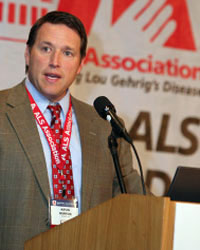ALS Registry Anniversary
 ATSDR celebrates the second year of the National ALS Registry. The Registry helps persons with ALS and scientists learn more about the disease. Help us defeat ALS!
ATSDR celebrates the second year of the National ALS Registry. The Registry helps persons with ALS and scientists learn more about the disease. Help us defeat ALS!
On October 19, 2012, the National Amyotrophic Lateral Sclerosis (ALS) Registry celebrates its second anniversary. The Registry now includes registrants from all 50 states. The second year of the National ALS Registry has been busy and productive, from enrolling registrants to creating programs that will improve the accuracy of the data received, as well as adding functions that make the Registry even more useful to researchers.
No one knows what causes most cases of ALS. Science has yet to find a cure for the disease. ALS affects nerve cells in the brain and spinal cord and causes muscle nerves to die. When this happens, the brain cannot control muscle movement. Patients in the late stages of the disease may be totally paralyzed. When the muscles in the chest stop working, patients no longer can breathe on their own. In most cases though, ALS does not affect senses, personality, intelligence, or memory: ALS patients remain aware of those around them and what is happening. They also can tell when the disease is getting worse.

Dr. Kevin Horton speaking at the National ALS Advocacy Day in Washington D.C.
Doctors estimate that about 5,000 people are diagnosed with ALS each year, but no one knows exactly how many people in the United States have the disease. In 2008, Congress enacted the ALS Registry Act [PDF - 199KB], which charges the Agency for Toxic Substances and Disease Registry (ATSDR) with creating and maintaining the National ALS Registry.
The Registry collects information on people with ALS by using both existing data (e.g., from Medicare, Medicaid, and Veterans Administration) and self-registration data. Specifically, the information gathered by the National ALS Registry can help researchers
- more accurately estimate the number of new cases of ALS identified each year,
- more accurately estimate the number of people with ALS at a specific point in time,
- better understand who gets ALS and what factors affect the disease, and
- improve care for people with this disease.
During its second year, the National ALS Registry implemented three new projects to enhance accuracy and usability.
- State and metropolitan area-based ALS surveillance projects are helping to evaluate the completeness of the National ALS Registry. Three states (Florida, New Jersey, Texas) and 8 cities (Atlanta, Baltimore, Chicago, Detroit, Las Vegas, Los Angeles, Philadelphia, and San Francisco) are identifying all neurologists who diagnose or provide care for people with ALS in those areas and checking their medical records for cases of ALS. As a result, ATSDR can compare these data to data from the same areas in the National ALS Registry. If some areas or groups are not well-represented in the Registry, ATSDR can find ways to reach these populations.
- A research notification system has been developed to inform people with ALS about new research studies (e.g., clinical trials, epidemiological studies). When researchers send ATSDR information about their studies, ATSDR will verify that the study has been approved by the researcher's institution. ATSDR then emails information about the study to Registry participants who may be eligible and have agreed to be contacted about such projects. The participants can then contact the researcher(s) if they’d like to participate in the studies.
- A bioregistry study has been launched to evaluate the feasibility of collecting blood, saliva, and tissue (biospecimens) from individuals enrolled in the National ALS Registry. Connecting biospecimens to information already collected from participants will make the Registry even more useful to researchers.
Additionally, a new mobile application makes it easy for people with ALS and caregivers to see the nearest ALS clinics and support groups. The application can be downloaded to iPads from the ALS Service Locator iTunes Page. The Registry will continue to add new ALS risk factor surveys to increase the knowledge base for the disease.
ATSDR and its partners look forward to advancing the Registry to address the future needs of both people with ALS and ALS researchers.
Get email updates
To receive email updates about this page, enter your email address:
Contact Us:
- Centers for Disease Control and Prevention
1600 Clifton Rd
Atlanta, GA 30333 - 800-CDC-INFO
(800-232-4636)
TTY: (888) 232-6348 - Contact CDC-INFO



